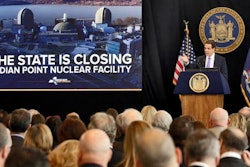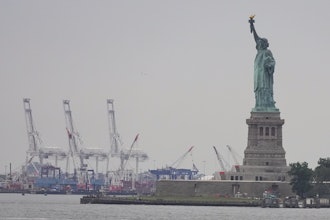
WASHINGTON (AP) — President Donald Trump on Friday directed Energy Secretary Rick Perry to take "immediate steps" to bolster struggling coal-fired and nuclear power plants to keep them open, calling it a matter of national and economic security.
Trump, who has frequently promised to bring back coal jobs, believes that keeping America's energy grid secure "protects our national security, public safety and economy from intentional attacks and natural disasters," White House press secretary Sarah Huckabee Sanders said in a statement.
Impending retirements of coal-fired and nuclear power plants are harming the nation's electric grid and reducing its resilience, and the president wants immediate action "to stop the loss of these resources," Sanders said.
Environmental groups decried the support for coal over cleaner energy sources, while energy industry groups warned that it could raise prices.
The directive comes as the Trump administration considers a plan to order grid operators to buy electricity from coal and nuclear plants to keep them open. The plan would direct regional transmission operators to buy power from coal and nuclear plants for two years to ensure grid reliability, "promote the national defense and maximize domestic energy supplies."
The Energy Department action, if ordered, would represent an unprecedented intervention into U.S. energy markets.
A draft memo urges federal action to "stop the further premature retirements of fuel-secure generation" from coal and nuclear plants that have struggled to compete with natural gas and renewable energy sources such as wind and solar power. The Associated Press obtained a copy of the memo.
The plan would exempt power plants from obeying a host of environmental laws and spend billions to keep coal-fired plants open.
A diverse group of energy industry groups — including oil, natural gas, solar and wind power — condemned the proposal, saying it would raise energy prices and distort markets.
"Unprecedented government intervention in the energy markets to support high-cost generation will hurt customers by taking more money out of their pockets rather than letting people keep more of what they earn," said Todd Snitchler of the American Petroleum Institute, the top lobbying group for the oil and gas industry.
"Orderly power plant retirements do not constitute an emergency for our electric grid," said Amy Farrell, vice president of the American Wind Energy Association. Farrell called the draft plan "a misapplication of emergency powers" and said, "There's certainly no credible justification to force American taxpayers to bailout uneconomic power plants."
But Robert Murray, chairman and CEO of Murray Energy Corp., the nation's largest privately owned coal company, hailed the White House announcement.
Murray has been seeking emergency action to boost his industry since last year and has met with Trump to argue that federal help was needed to avert thousands of layoffs and maintain the reliability of the electric grid up and down the East Coast.
"We support all efforts to ensure the security of our nation's electric power supply, which is critical to the reliability of our electric power grids, to low-cost electricity and to our national defense," Murray said Friday in a statement.
The draft plan calls for the Energy Department to exercise emergency authority under a pair of federal laws typically reserved for wars or natural disasters. The plan calls for Perry to use the Federal Power Act and the Defense Production Act to temporarily delay retirements of coal and nuclear plants.
"This prudent stop-gap measure" will allow coal and nuclear plants to remain open while the department takes further steps to secure the grid, the memo said.
Among those arguing for federal action is Jeff Miller , a well-connected GOP fundraiser who has served as an adviser to Perry and other Republicans and ran Perry's unsuccessful presidential campaign in 2016.
Miller, who also is close to House Majority Leader Kevin McCarthy, R-Calif., dined with Trump in April along with McCarthy and GOP donors. Miller is a lobbyist for FirstEnergy Solutions, a bankrupt power company that relies on coal and nuclear energy to produce electricity. Ohio-based FirstEnergy is the largest customer for Murray's Ohio-based coal company and has joined with Murray to seek federal help.
Michael Panfil, director of federal energy policy for the Environmental Defense Fund, called Trump's directive "an unprecedented, illegal government handout" to the coal and nuclear industries and vowed to fight the order in court.
"Americans should not have to pay for dirty, uneconomic coal plants that pollute our environment and make people sick — especially when there are cleaner, more affordable energy options available," Panfil said.
The independent Federal Energy Regulatory Commission rejected a similar request by Perry in January, saying in a unanimous decision that there's no evidence that past or planned retirements of coal-fired power plants pose a threat to grid reliability.
The draft memo was first reported by Bloomberg News.






















